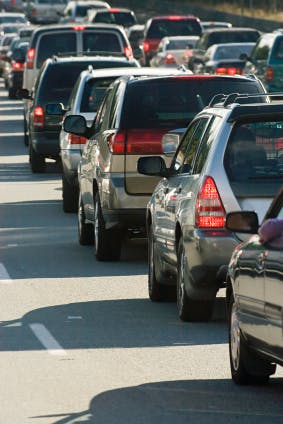I was sitting in traffic on the I-5 south of Portland where I was going on Hour Two of not moving more than a half a mile.
I pulled onto the shoulder and snuck down to the nearest exit where I decided I would camp out and get some food while the traffic situation got sorted out. I was still 20 miles from home and not getting there anytime soon.
When I took a job 30 miles south of Portland, I figured it would be a pretty good commute. I was going the opposite direction that most traffic went, and it was almost all freeway. How bad could it be?
In short, it can be very bad, but alternatives can be even worse.
Extreme commuting and the recession
Memories of sitting idly in a car stuck on the way to work was brought up by a recent Wall Street Journal piece about long commutes:
More than 3.2 million workers in the U.S., or about 2.4% of the nation’s workforce, travel more than 90 minutes to work each way, according to the latest data available from the Bureau of Transportation Statistics. (According to the Bureau, any commute over one hour is considered extreme.)
Although the average commute hasn’t changed much in the past five years, in certain pockets, such as parts of Southern California and the New York metro area, the number of people with extreme commutes has increased, says Kate Lister, of the San Diego-based Telework Research Network.”
And if it seems to be almost contrary for long commutes to hold their own in this type of economic environment, think again. Keeping (or taking) that far away job may be the only thing keeping some households afloat. Between stagnated wages and fluctuating gas prices, you could be getting a pay decrease every year you do an extreme commute.
The alternatives are simple, but not easy. Live closer to where you work or take a job closer to where you live. If you’re able, convert some of that time to remote work.
Living choices versus sustainability
Of course, those alternatives aren’t really possible for those who like where they live but can’t find a job there (or would love to move closer, but can’t).
Take some of the far flung suburbs of Washington D.C. Certainly there are jobs in some of these cities, but the best opportunities are clearly inside the Beltway. If you like the space you’re in, you have kids in school, your spouse has a job close-by, or you can’t afford to live that close, you end up withone of those extreme commutes.
How sustainable is this? Clearly, driving long distances has an environmental and cultural toll on the cities where it is popular. But even beyond those questions, how long can your body and mind take that toll? The Journal article mentions a study that showed a 40 percent increase in divorce rates among those with long commutes. Sitting in a car that long under any circumstances is going to take its toll on your health, too.
And while there are people who don’t mind (or maybe even enjoy) the long commute (I know several), many people aren’t simply choosing to do a 90 minute plus commute, or round-trip plane flights every week, with enthusiasm. When it transitions from a choice you’re making to a choice you’re being forced into, that makes it difficult for anyone. And that can rear its head in the workplace, too.
Employer impact
If you have a high percentage of people commuting from long distances, this could mean a major turnover concern. And for employers in this position, trying to help with things like flexible start and end times, telework for those who are able, and other such assistance can certainly lend a hand and make it feel less like they are stuck.
When you’re looking to hire someone who will be traveling 30-90 miles a day to come to work though, some serious questions should be going through your mind. Certainly, it is worth challenging candidates on this issue and figuring out if there is some tolerance for it. I know companies I have worked for have passed on candidates who we knew couldn’t make the long commute work.
Going back to where I was at a few years ago though, even the best day of commuting was still an annoyance. Alternatives may be lacking right now, but employers and employees alike can bet on the fact that they won’t be lacking forever.
